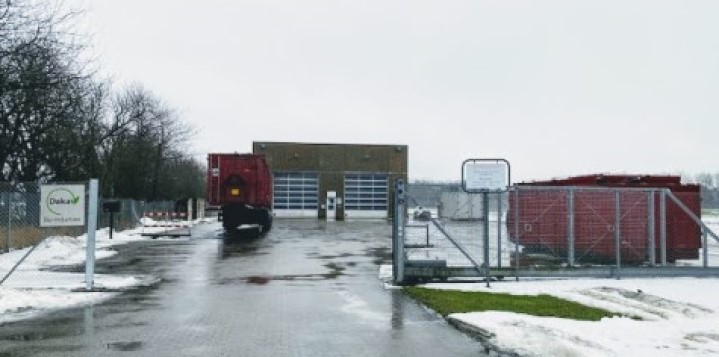Bornholm agriculture contributes to sustainable cycle
31.03.2021
Today, Daka SecAnim’s Bornholm branch is located at the former Bornholm Andelssvineslagterier near Nyker. Here Alex and Martin have their daily work, and are responsible for collecting and handling the dead production animals from the Bornholm agriculture, before they are sent to the Daka factory in Randers.

Daka SecAnim is specialised in handling animal by-products from slaughterhouses and agriculture. This means that the dead production animals are handled safely to minimise the risk of infection, while the resources from the animals are recycled and thus preserved in the natural cycle. The dead animals are converted into biofuel, organic fertiliser and biodiesel. Therefore, the approximately 250 Bornholm farmers help to ensure a sustainable use of the dead animals when they are registered for collection by Daka.
Monday is extra important
Every weekday, Alex or Martin starts at 6am by checking the Daka truck’s computer for the planned “animal route”. The Daka truck travels almost 200 km every day, reaching 45 pick-up sites on Bornholm, but Monday is a particularly important day because no collections are made at weekends, as the factory in Randers is unable to produce regularly at weekends.
“Mondays are always extra busy as no collections are made at weekends. That’s why registering animals over the weekend is particularly important, because the animals must not be left for too long. The longer the animal is in the decomposition process, the more difficult it is for us to convert the dead animals into fertiliser and biodiesel,” explains Alex Reinhold Pedersen, Daka’s operations manager on Bornholm. For the same reason, it is also important that farmers register their animals for collection as soon as they are found dead, or add extra animals if they have already registered, so that the truck can carry everything every time, even if you pay per animal and not per stop.
At 1pm the truck returns to Nyker. Here the day’s sorting work begins, with the animals being reloaded into secure transport crates. The crates, which normally contain 27 tonnes, will be taken by boat from the Port of Rønne to the Port of Køge at 17.00, from where they will be transported to Randers.
Sustainable recycling in Danish agriculture
When a dead animal from agriculture is collected and sent to Daka, it is safely processed into biofuel for energy production, e.g. in the cement industry, recycled fertiliser for agriculture and biodiesel for use in the transport sector. An average pig, for example, can be turned into enough biodiesel to travel about 400 km in a diesel car. So in this way, agriculture contributes positively to sustainable recycled products that can be used in agriculture and other industries where fossil products are being displaced.
In 2020, Daka SecAnim had a life cycle assessment carried out which shows that in 2019, Daka SecAnim’s activities saved a net 149,350 tonnes of CO2eq[1] from the atmosphere. While Daka Denmark as a whole reduced by 277,000 tonnes CO2eq by displacing fossil fuels, artificial fertilizers, palm oil and soy proteins etc. in agriculture and industry.
[1] The analysis is a so-called C-LCA (Consequential Life Cycle Analysis) carried out for Daka Denmark A/S and reviewed by external specialists in life cycle analysis.
